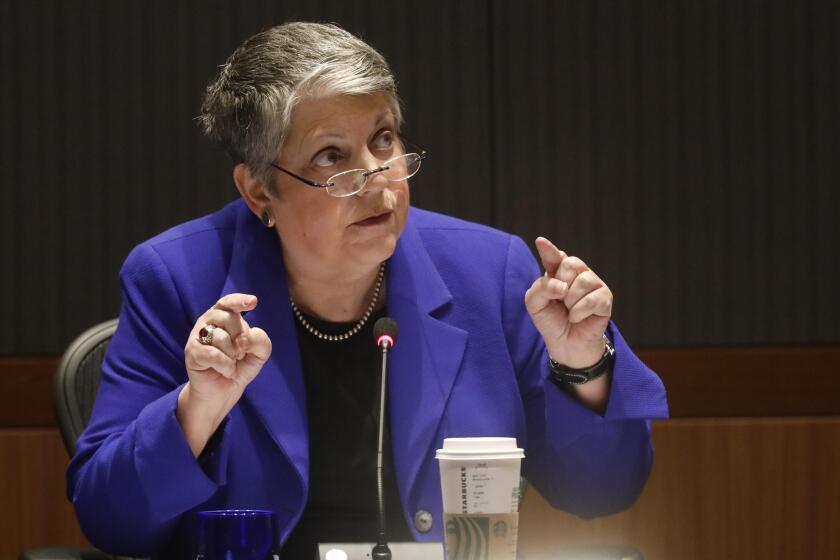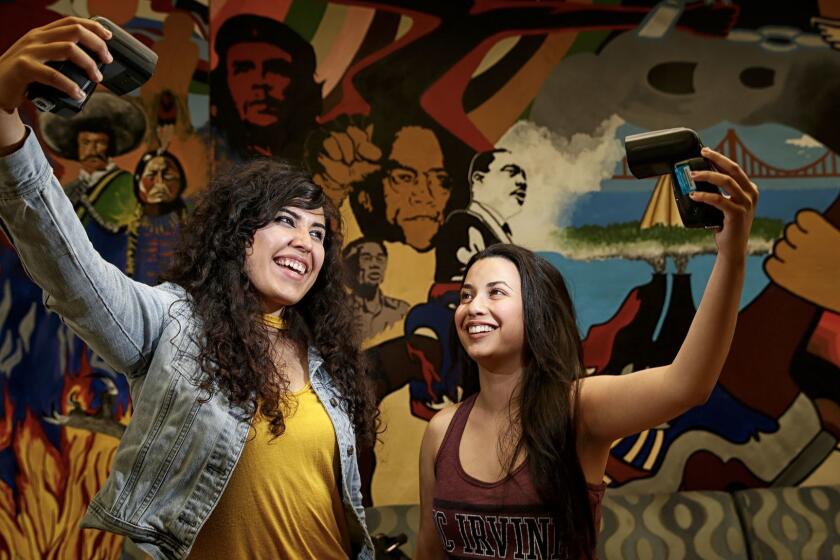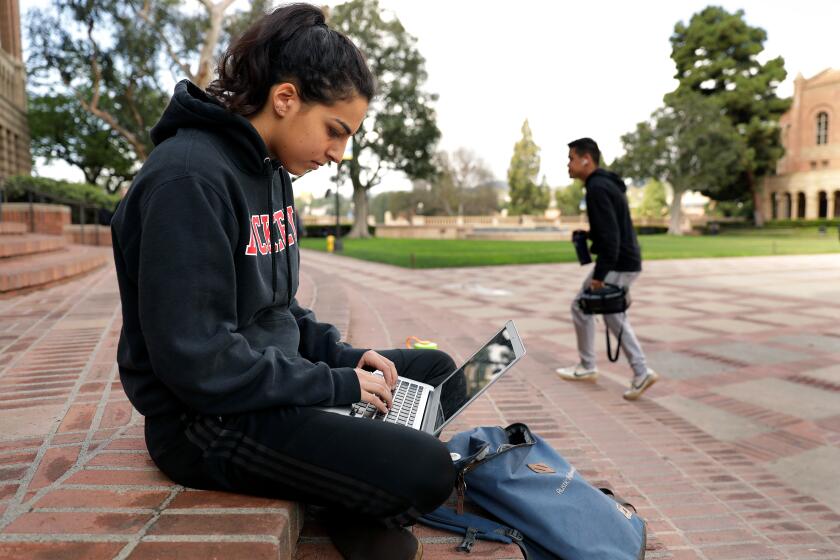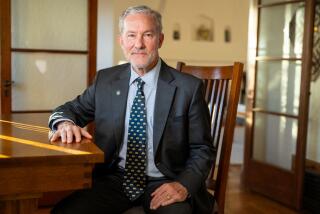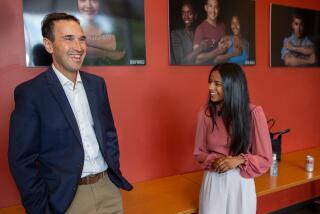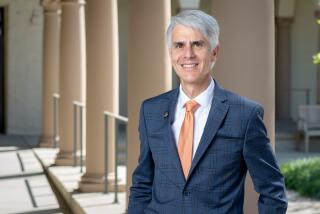Michael V. Drake named new UC president, first Black leader in system’s 152-year history
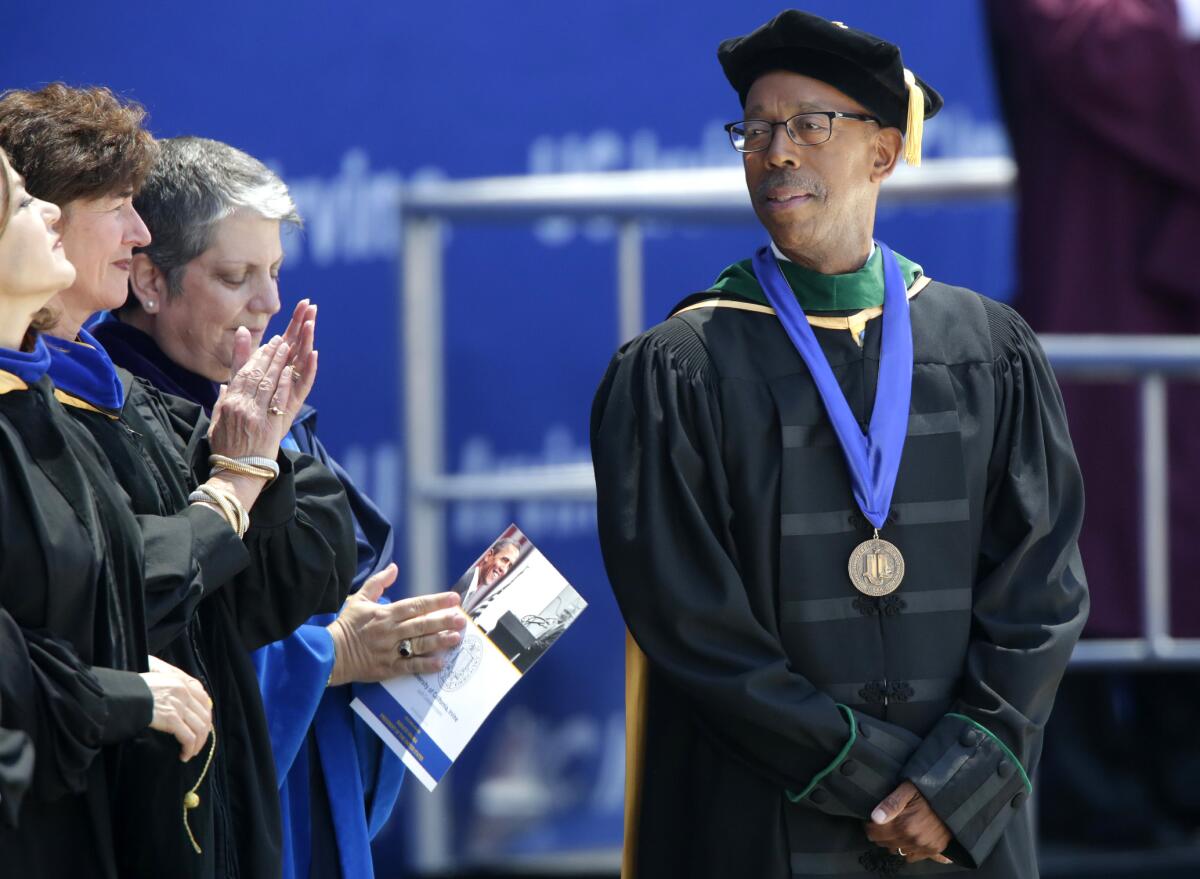
Michael V. Drake, a national champion for access and equity who previously headed The Ohio State University and UC Irvine, was selected Tuesday as the new president of the University of California and first Black leader in the system’s 152-year history.
The UC Board of Regents unanimously approved Drake’s selection, seizing a historic opportunity to hire a person of color to head a system whose 285,000 students are now majority nonwhite as the nation grapples with a sweeping racial reckoning. He will succeed President Janet Napolitano, who will step down Aug.1 after seven years.
In brief remarks after the vote, Drake thanked his supporters and said he looked forward to working with UC colleagues to meet such major challenges as the global pandemic, climate change and “the yawning wounds of social injustice.”
He said he changed his plans to retire when he was presented with the chance to return to the university that transformed his life.
“Thinking about the trajectory of the country ... the place that the university was and the chance that perhaps there might be a way to contribute further to the future really became a compelling opportunity,” Drake said.
Board Chairman John A. Pérez said Drake emerged from the 10-month search process as the candidate of choice not only because of his vast experience but also because he reflects UC values to support the “whole student,” faculty and staff and understands the university’s “transformative power.”
“We’re just lucky to get him to dedicate these next years to continuing to move the university, to fulfill that public mission, to serve the totality of the state of California in a meaningful way,” Pérez said.
Drake, who will turn 70 on Thursday, would bring leadership experience, academic credentials, political savvy and personal qualities to that position at a time of deep challenges facing the UC system.
Janet Napolitano took the helm of the University of California seven years ago and initially stumbled. But she leaves UC with advances on many causes.
He would oversee the nation’s most complex public research university system — a $39.8-billion operation of 10 campuses, five medical centers and three national laboratories — as it confronts a global pandemic, financial uncertainty and demands to further diversify campuses and defund UC police.
“Michael Drake is a spectacular choice for the University of California,” said Ted Mitchell, president of the American Council on Education, which represents more than 1,700 colleges and universities. “He has proven himself to be a visionary and effective leader in every role he’s taken on, from the University of California to Ohio State to national roles in leading associations, including the NCAA.”
Unlike Napolitano, a former Homeland Security secretary and Arizona governor who came to the job with no UC or academic leadership experience, Drake has spent nearly four decades in the California university system. He earned his medical degree in ophthalmology at UC San Francisco, joined the faculty in 1979 and became the UC vice president for health affairs in 2000. He was named UC Irvine chancellor in 2005 and served there for nine years before heading to Ohio State in 2014.
At the same time, Drake has served as board chairman for the NCAA, the Assn. of American Universities and the Assn. of Public and Land-Grant Universities.
UC Irvine chancellor named new Ohio State president
Drake emerged as a rumored top candidate immediately after Napolitano announced she was stepping down. Many UC veterans believed he could both reassert the university’s national leadership role and attend to its particular issues, in partnership with the system’s uniquely empowered faculty.
“Michael is as poised as anyone can be to be successful,” said George Blumenthal, a former UC Santa Cruz chancellor who now heads the UC Berkeley Center for Studies in Higher Education. “He’s been around the block. He knows higher education well and the UC system well.”
A hallmark of Drake’s long career has been widening access to higher education for students from diverse racial, ethnic and economic backgrounds. As vice president for UC health affairs, he increased the diversity of newly minted medical professionals through a program that offered incentives for them to work in underserved communities. He also worked with UC Irvine to launch a groundbreaking program to develop a pipeline of “physician leaders” to serve the unique health needs of the Latino community.
Under his Irvine chancellorship, Drake laid the groundwork for the campus to become a Hispanic Serving Institution, qualifying it for federal grants to support Latino students. Irvine is now the top UC choice for Latino freshman applicants.
For most of her life, Angela Vera never imagined herself at the University of California.
Drake continued his commitment to diversity at Ohio State. Under his tenure, the university boosted the number of students who are low-income, underrepresented minorities and the first in their families to attend college. Black students, however, remain underrepresented at Ohio State, accounting for 6.8% of enrolled students in a state where Black residents make up 13% of the population. That’s a larger gap than at UC campuses, where Black students account for about 4% of enrollment compared with the state’s proportion of Black residents at 6%.
At Ohio State, Drake also worked to lower the cost of attendance and increase financial aid. He introduced a financial model that raises costs for tuition, mandatory fees, housing and dining once for incoming freshmen, then locks them in for four years. Under his tenure, Ohio State boosted financial aid by more than $200 million since 2015, twice his initial target, and increased grants and scholarships.
He is also credited with helping Ohio State hit record highs in applications, graduation rates and sponsored research awards. Last year, he announced a $4.5-billion fundraising campaign, the largest goal in the school’s history.
While some faculty at both Ohio State and UC Irvine said he was not the most visible or hands-on academic leader, he was popular with students. Alexis Gomes, an incoming fifth-year Ohio State student in neuroscience, said students appreciated his initiatives to cut fees, lower textbook costs and provide all students with an iPad, Apple pencil and a notetaking app.
Drake steps into the top UC job at a time of financial distress. The COVID-19 pandemic has cost the university system $1.2 billion in increased costs and lost revenues from March to the end of April, and faces potential state budget cuts. At the same time, UC regents have pulled a proposal for now to raise tuition in light of pandemic-caused economic distress.
The University of California was hit with $558 million in unanticipated costs in March alone due to the coronavirus, a staggering sum as students canceled housing and dining contracts, medical centers paused elective surgeries and costs to gear up online learning soared.
UC veterans are hopeful his political savvy and personable manner will help secure more funding and improve relations with Sacramento, and they point to his success in winning approval for a UC Irvine law school in 2007 after a two-decade battle. They also say his success at mending fences with Erwin Chemerinsky over the law school deanship — Drake offered him the job, withdrew the offer, then restored it amid a national political furor — illustrates his ability to recognize his mistakes, apologize and move on.
Chemerinsky went on to co-teach a UC Irvine undergraduate class with Drake on civil rights, music and the U.S. Supreme Court. He said he would be “thrilled” with a Drake presidency.
“He has a wonderful combination of warmth and rigor,” said Chemerinsky, who now heads UC Berkeley’s law school. “All of the skills that you would want in a university president, he has them.”
Drake weathered controversies at Ohio State as well, including the firing of a popular marching band director over what a university investigation found to be the band’s “sexualized culture.”
At UC, other top issues Drake will immediately face include managing campus fall reopenings during the pandemic, rising demands to defund campus police and calls to better support Black students triggered by the killing of George Floyd by a Minneapolis police officer.
The president-elect, who will take the helm by Aug. 15, will be paid a base annual salary of $890,000 — a significant boost from Napolitano’s $570,000 but slightly less than his Ohio State salary. He agreed to a 10% pay cut through next June, as other UC leaders have done in light of pandemic-related fiscal challenges.
Drake was born in New York City and raised in New Jersey and Sacramento as the son of a doctor and a social worker. He attended Stanford University before moving to UC San Francisco for medical school. A music fan, he plays the guitar and is an avid cyclist. He is married to Brenda Drake, an attorney, and has two sons and four grandchildren.
More to Read
Start your day right
Sign up for Essential California for news, features and recommendations from the L.A. Times and beyond in your inbox six days a week.
You may occasionally receive promotional content from the Los Angeles Times.
